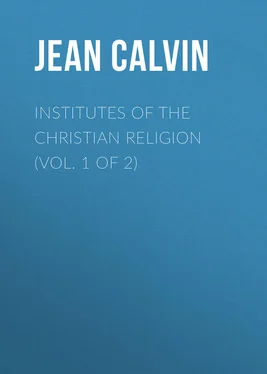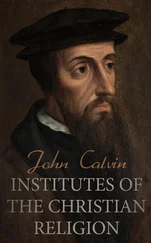Jean Calvin - Institutes of the Christian Religion (Vol. 1 of 2)
Здесь есть возможность читать онлайн «Jean Calvin - Institutes of the Christian Religion (Vol. 1 of 2)» — ознакомительный отрывок электронной книги совершенно бесплатно, а после прочтения отрывка купить полную версию. В некоторых случаях можно слушать аудио, скачать через торрент в формате fb2 и присутствует краткое содержание. Жанр: foreign_antique, foreign_prose, на английском языке. Описание произведения, (предисловие) а так же отзывы посетителей доступны на портале библиотеки ЛибКат.
- Название:Institutes of the Christian Religion (Vol. 1 of 2)
- Автор:
- Жанр:
- Год:неизвестен
- ISBN:нет данных
- Рейтинг книги:3 / 5. Голосов: 1
-
Избранное:Добавить в избранное
- Отзывы:
-
Ваша оценка:
- 60
- 1
- 2
- 3
- 4
- 5
Institutes of the Christian Religion (Vol. 1 of 2): краткое содержание, описание и аннотация
Предлагаем к чтению аннотацию, описание, краткое содержание или предисловие (зависит от того, что написал сам автор книги «Institutes of the Christian Religion (Vol. 1 of 2)»). Если вы не нашли необходимую информацию о книге — напишите в комментариях, мы постараемся отыскать её.
Institutes of the Christian Religion (Vol. 1 of 2) — читать онлайн ознакомительный отрывок
Ниже представлен текст книги, разбитый по страницам. Система сохранения места последней прочитанной страницы, позволяет с удобством читать онлайн бесплатно книгу «Institutes of the Christian Religion (Vol. 1 of 2)», без необходимости каждый раз заново искать на чём Вы остановились. Поставьте закладку, и сможете в любой момент перейти на страницу, на которой закончили чтение.
Интервал:
Закладка:
XXIV. We might readily prove from many passages the falsehood of their assumption, that, whenever the name of God is mentioned absolutely in the Scripture, it means only the Father. And in those places which they cite in their own defence, they shamefully betray their ignorance, since the Son is there added; from which it appears, that the name of God is used in a relative sense, and therefore is particularly restricted to the Person of the Father. Their objection, that, unless the Father alone were the true God, he would himself be his own Father, is answered in a word. For there is no absurdity in the name of God, for the sake of dignity and order, being peculiarly given to him, who not only hath begotten of himself his own wisdom, but is also the God of the Mediator, of which I shall treat more at large in its proper place. For since Christ was manifested in the flesh, he is called the Son of God, not only as he was the eternal Word begotten of the Father before time began, but because he assumed the person and office of a Mediator, to unite us to God. And since they so presumptuously exclude the Son from Divine honours, I would wish to be informed, when he declares that there is none good but the one God, 278 278 Matt. xix. 17.
whether he deprives himself of all goodness. I speak not of his human nature, lest they should object, that, whatever goodness it had, it was gratuitously conferred on it. I demand whether the eternal Word of God be good or not. If they answer in the negative, they are sufficiently convicted of impiety; and if in the affirmative, they cut the throat of their own system. But though, at the first glance, Christ seems to deny himself the appellation of good, he furnishes, notwithstanding, a further confirmation of our opinion. For, as that is a title which peculiarly belongs to the one God, forasmuch as he had been saluted as good, merely according to a common custom, by his rejection of false honour, he suggested that the goodness which he possessed was Divine. I demand, also, when Paul affirms that God alone is immortal, wise, and true, 279 279 1 Tim. i. 17.
whether he thereby degrades Christ to the rank of those who are mortal, unwise, and false. Shall not he then be immortal who from the beginning was life itself, and the giver of immortality to angels? Shall not he be wise who is the eternal Wisdom of God? Shall not he be true who is truth itself? I demand further, whether they think that Christ ought to be worshipped. For, if he justly claims this as his right, that every knee should bow before him, 280 280 Phil. ii. 10.
it follows that he is that God, who, in the law, prohibited the worship of any one but himself. If they will have this passage in Isaiah, “I am, and there is no God besides me,” to be understood solely of the Father, I retort this testimony on themselves; since we see that whatever belongs to God is attributed to Christ. Nor is there any room for their cavil, that Christ was exalted in the humanity in which he had been abased; and that, with regard to his humanity, all power was given to him in heaven and in earth; because, although the regal and judicial majesty extends to the whole Person of the Mediator, yet, had he not been God manifested in the flesh, he could not have been exalted to such an eminence, without God being in opposition to himself. And Paul excellently determines this controversy, by informing us that he was equal with God, before he abased himself under the form of a servant. 281 281 Phil. ii. 6, 7.
Now, how could this equality subsist, unless he had been that God whose name is Jah and Jehovah, who rides on the cherubim, whose kingdom is universal and everlasting? No clamour of theirs can deprive Christ of another declaration of Isaiah: “Lo, this is our God, we have waited for him;” 282 282 Isaiah xxv. 9.
since in these words he describes the advent of God the Redeemer, not only for the deliverance of the people from exile in Babylon, but also for the complete restoration of the church. Nor do they gain any thing by another cavil, that Christ was God in his Father. For although we confess, in point of order and degree, that the Father is the fountain of the Deity, yet we pronounce it a detestable figment, that the essence belongs exclusively to the Father, as though he were the author of the Deity of the Son; because, on this supposition, either the essence would be divided, or Christ would be only a titular and imaginary god. If they admit that the Son is God, but inferior to the Father, then in him the essence must be begotten and created, which in the Father is unbegotten and uncreated. I know that some scorners ridicule our concluding a distinction of Persons from the words of Moses, where he introduces God thus speaking: “Let us make man in our image.” 283 283 Gen. i. 26.
Yet pious readers perceive how frigidly and foolishly Moses would have introduced this conference, if in one God there had not subsisted a plurality of Persons. Now, it is certain that they whom the Father addressed, were uncreated; but there is nothing uncreated, except the one God himself. Now, therefore, unless they grant that the power to create, and the authority to command, were common to the Father, the Son, and the Spirit, it will follow, that God did not speak thus within himself, but directed his conversation to some exterior agents. Lastly, one place will easily remove their two objections at once. For when Christ himself declares, that God is a Spirit, it would be unreasonable to restrict this solely to the Father, as though the Word were not also of a spiritual nature. But if the name of Spirit is equally as applicable to the Son as to the Father, I conclude that the Son is comprehended under the indefinite name of God. Yet he immediately subjoins, that none are approved worshippers of the Father, but those who worship him in spirit and in truth. 284 284 John iv. 24.
Whence follows another consequence, that, because Christ performs the office of a Teacher, in a station of inferiority, he ascribes the name of God to the Father, not to destroy his own Deity, but by degrees to raise us to the knowledge of it.
XXV. But they deceive themselves in dreaming of three separate individuals, each of them possessing a part of the Divine essence. We teach, according to the Scriptures, that there is essentially but one God; and, therefore, that the essence of both the Son and the Spirit is unbegotten. But since the Father is first in order, and hath of himself begotten his wisdom, therefore, as has before been observed, he is justly esteemed the original and fountain of the whole Divinity. Thus God, indefinitely, is unbegotten; and the Father also is unbegotten with regard to his Person. They even foolishly suppose, that our opinion implies a quaternity; whereas they are guilty of falsehood and calumny, in ascribing to us a figment of their own; as though we pretended that the three Persons are as so many streams proceeding from one essence, when it is evident, from our writings, that we separate not the Persons from the essence, but, though they subsist in it, make a distinction between them. If the persons were separated from the essence, there would perhaps be some probability in their argument; but then there would be a trinity of Gods, not a trinity of persons contained in one God. This solves their frivolous question, whether the essence concurs to the formation of the Trinity; as though we imagined three Gods to descend from it. Their objection, that then the Trinity would be without God, is equally impertinent. Because, though it concurs not to the distinction as a part or member, yet the Persons are not independent of it, nor separate from it; for the Father, unless he were God, could not be the Father; and the Son is the Son only as he is God. Therefore we say, that the Deity is absolutely self-existent; whence we confess, also, that the Son, as God, independently of the consideration of Person, is self-existent; but as the Son, we say, that he is of the Father. Thus his essence is unoriginated; but the origin of his Person is God himself. And, indeed, the orthodox writers, who have written on the Trinity, have referred this name only to the Persons; since to comprehend the essence in that distinction, were not only an absurd error, but a most gross impiety. For it is evident that those who maintain that the Trinity consists in a union of the Essence, the Son, and the Spirit, annihilate the essence of the Son and of the Spirit; otherwise the parts would be destroyed by being confounded together; which is a fault in every distinction. Finally, if the words Father and God were synonymous – if the Father were the author of the Deity – nothing would be left in the Son but a mere shadow; nor would the Trinity be any other than a conjunction of the one God with two created things.
Читать дальшеИнтервал:
Закладка:
Похожие книги на «Institutes of the Christian Religion (Vol. 1 of 2)»
Представляем Вашему вниманию похожие книги на «Institutes of the Christian Religion (Vol. 1 of 2)» списком для выбора. Мы отобрали схожую по названию и смыслу литературу в надежде предоставить читателям больше вариантов отыскать новые, интересные, ещё непрочитанные произведения.
Обсуждение, отзывы о книге «Institutes of the Christian Religion (Vol. 1 of 2)» и просто собственные мнения читателей. Оставьте ваши комментарии, напишите, что Вы думаете о произведении, его смысле или главных героях. Укажите что конкретно понравилось, а что нет, и почему Вы так считаете.












